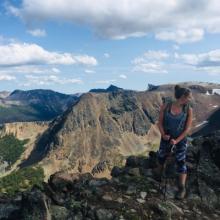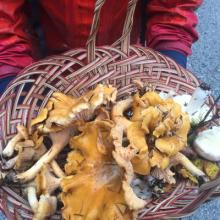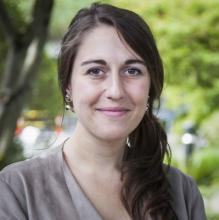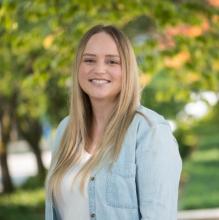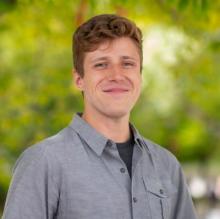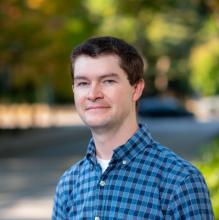Research Description
This Participatory Action Research study aims to support health and social wellbeing for women who have been involved in the criminal justice system in British Columbia, with a specific focus on food justice. Ongoing colonial patriarchy has resulted in gendered correlates of crime and disproportionate rates of incarceration for Indigenous women, and despite widespread acknowledgement that social and criminal justice systems are failing Indigenous women and children, and growing recognition of the potentials of land-based healing through foodways, and there continues to be limited research undertaken to explore the interconnections among wellbeing, foodways and criminal rehabilitation. In this context, I will work with justice-involved women to develop culturally safe food justice programming that confronts ongoing colonialism and accounts for the diverse experiences of marginalization that Indigenous and non-Indigenous justice-involved women face. This research will be conducted in partnership with Fraser Valley Institution, a federal women’s prison in Abbotsford, BC, and the Elizabeth Fry Society, a non-profit organization that provides programming and support for paroled women and their children. I will work collaboratively with incarcerated and paroled women to co-develop food justice programming, drawing on Indigenous legal traditions to support health and wellbeing and improve correctional outcomes. This study will use ethnographic case study design, be informed by critical theory and decolonizing methodologies, and result in evidence to support gender-responsive and trauma-informed food justice programming for justice-involved women and their children. The participatory methodology will tackle current knowledge gaps and contribute to broader understandings of the impacts of Indigenous foodways and legal traditions to support wellbeing and address health, social, criminal justice, and gender inequities. My objective is to contribute to evidence for policy and practice across academic, federal corrections and community contexts, integrating Indigenous legal traditions into correctional programming to move theoretical understandings of reconciliation in colonial criminal justice systems forward. My ultimate aim is to work with justice-involved women to develop a non-profit social enterprise that supports food justice, health and community belonging for them and their children.
What does being a Public Scholar mean to you?
Being a Public Scholar is a commitment to action-oriented, community-driven research that is focused on supporting the health, wellbeing and dignity of the community, it's a reframing of academic research and scholarship as a mechanism to support social change, health and social equity. I see it is a community of support that acknowledges academic privilege and furthers opportunities for research as an act of visioning and collaboration, a building of something better.
In what ways do you think the PhD experience can be re-imagined with the Public Scholars Initiative?
In endless ways! For me, doctoral research has been an opportunity to respond to community priorities, leverage research funding and support health and wellbeing for people in prison. I believe that PhDs should happen in community, that many important and vital types of learning happen around kitchen tables and community meeting spaces, and that relationships are foundational across all processes. The Public Scholars Initiative provides opportunities for relationship building, for creating and mobilizing knowledge outside of formal university spaces.
How do you envision connecting your PhD work with broader career possibilities?
My journey in academia has been one of relationship, and I am fortunate to have relationships and partnerships across community, organizational and governmental contexts. I see my career flowing through these relationships. In all honestly, I'm not completely sure what the next steps might be, but know that I have the guidance of community leaders, Indigenous Elders, transformative scholars and research partners and collaborators to guide me.
How does your research engage with the larger community and social partners?
Participatory Action Research is founded on the building and maintaining of relationships. My work is done in collaboration, recognizing that I am not an expert in the lived realities of incarceration and racialization. Across projects I work with Peer Leaders, Indigenous Elders, correctional leaders and staff, and organizational representatives working with people who have been in prison, Indigenous communities and other groups. My research is not my research at all, but a working together, a collaborative building, guided by the wisdom and expertise of women who are and have been in prison.
Why did you decide to pursue a graduate degree?
I have been working in equity-oriented and community-based research since 2013, and have had the privilege of witnessing the ways that action-oriented research can support community priorities. During my Master's I studied the impact of a pre-existing correctional agriculture program, spending time with federally incarcerated men in a prison farm where they grew, harvested and donated produce to surrounding food insecure communities and food-based organizations, include rural and remote Indigenous communities. I learnt so much from the participating men and community recipients, while also seeing the potential of participatory methods to support community-driven programming that centres community knowledge holders and provides opportunities for democratic community-driven decision making. A doctoral degree was the next step towards leveraging my academic privilege to create programming with and for justice-involved people.
Why did you choose to come to British Columbia and study at UBC?
I have been at UBC since my undergraduate degree, and the decision to stay for my doctoral degree was multi-layered. The main reason was the relationships I have built in the UBC Critical Research in Health and Healthcare Inequities (CRiHHI) Research Unit, based out of the School of Nursing. I have the privilege of working alongside amazing staff who provide ongoing intellectual and emotional support, as well as support and mentorship from faculty, including my co-supervisor, Dr. Helen Brown. My ongoing work as a research manager with Helen has also provided fruitful and supportive opportunities to network and collaborate across the wider UBC health & justice community. There are many other reasons, including the wonderful community of friends and peers I have across Vancouver, the views of the mountains when I bike to campus, and how easy it is to find wild blackberries in the summers here.
What is it specifically, that your program offers, that attracted you?
The Interdisciplinary Graduate Studies Program (ISGP) provides a unique environment for me to undertake Participatory Action Research ((PAR) rooted in interdisciplinary and diverse knowledge related to health and wellness, sex and gender, criminal justice, food justice, and Indigenous legal traditions. This program allows the flexibility to integrate the diverse methodological and theoretical approaches needed to respond to the complex barriers to health, wellness and food justice facing incarcerated and paroled women in Canada today. It has also provided me with space and time to focus on relationship-building, something that is foundational to participatory research yet difficult to fit into many formal graduate program structures and timelines.
For you, what was the best surprise about graduate life, about UBC or life in Vancouver?
I have lived in Vancouver and attended UBC since 2009, and am consistently surprised by how suddenly spring emerges here. I have also recently found a network of other women whose doctoral work is focused on the intersections of health and justice - and while surprised might not be the right word - I have found the support of peers with aligned objectives and values so important, and am regularly amazed at the level of care this community provides.
What aspect of your graduate program do you enjoy the most or are looking forward to with the greatest curiosity?
I am incredibly excited to start working closely with the women at Fraser Valley Institute (FVI) and those served by Elizabeth Fry Society. I have been volunteering at FVI for over a year, and look forward to having more opportunities to listen to and learn from the women there, and to find ways to support their priorities through research. Food is often a central aspect of identity and belonging, and creating spaces to talk about food with justice-involved women in strengths-based ways will be complicated, difficult and joyful: what we like to eat, what historic forces have constrained our dietary decisions, how our family context impacts our relationships to food, or our body and to each other, and how to support each other through the lens of food.
What do you see as your biggest challenge(s) in your future career?
Interdisciplinary participatory research is multi-layered and complex, and measures of participatory work done in a good way – such as ongoing relationship building and integrated community-driven Knowledge Mobilization - are not widely recognized in the academic world. This will be a challenge, but I look forward to working with other allied scholars and communities to transform how research with communities is conducted and what metrics of success are recognized.
How do you feel your program is preparing you for those challenges?
ISGP is providing me with the flexibility to build my own degree path, take the time I need to develop relationships, and collaboratively build processes that address the needs and priorities of my community partners. This flexibility has allowed me to develop relationships with community organizations and social enterprises across Vancouver, ways of learning outside of the traditional classroom context that is integral to my specific research objectives. Additionally, my co-supervisor, Helen Brown, has and continues to provide important mentorship on alternate and transformative ways to take part in the academic world.
What aspects of your life or career before now have best prepared you for your UBC graduate program?
There are several experiences and opportunities that are interwoven into my current capacity as a participatory researcher. As a professional cook, I developed a good sense of humour and the ability to talk, teach and listen about food from across perspectives. A brief stint as an art student helped me to think visually and see the value of arts as knowledge sharing, something that has come in handy from coding map development to Knowledge Mobilization planning. Finally, my years as a research assistant and later research manager in the CRiHHI Research Unit taught me that research can matter, can be done in partnership with people whose wisdom and insight is profound yet often marginalized in academic spaces, and can create change.
What do you like to do for fun or relaxation?
In a previous life, I was a professional cook, and that love of food has propelled me into my current research interests while remaining a favourite way to spend my time. I also love backcountry skiing and hiking, and enjoy finding ways to make elaborate meals in remote and beautiful places.
Do you have any tips for students from your home country coming to Canada / to UBC Grad School?
Find supervisors that you feel comfortable being vulnerable with. Equally important is to find peers whose work and values are aligned with your own, and have consistent mechanisms to touch base and hold one another up. Finally, it’s important to take breaks, to spend time in nature, read frivolous novels, and find ways to get far away from your computer once in a while!
Being a Public Scholar is a commitment to action-oriented, community-driven research that is focused on supporting the health, wellbeing and dignity of the community, it's a reframing of academic research and scholarship as a mechanism to support social change, health and social equity.


